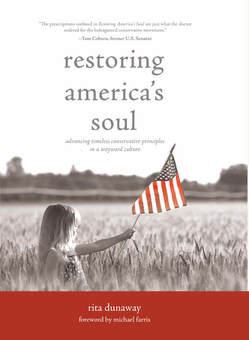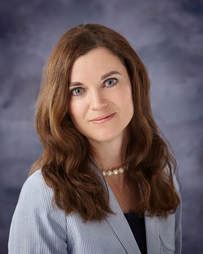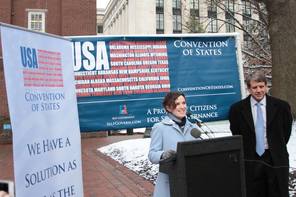
"Everyone who calls themselves a 'conservative' must read this book. I haven't read a simpler, clearer description of conservatism or a better indictment of the forces that are trying to destroy the ideas that make America great."
—Jim DeMint, former U.S. Senator
"The prescriptions outlined in Restoring America's Soul are just what the doctor ordered for the beleaguered conservative movement."
—Tom Coburn, former U.S. Senator
Q&A with Rita Dunaway
Author of Restoring America’s Soul: Advancing Timeless Conservative Principles in a Wayward Culture

Q: What motivated you to write this book?
A: Two factors compelled me to write the book. First, I started to notice how much room for improvement there was in the way conservatives talk about issues. What I noticed, specifically, was that we tend to oppose public policies without defining what we believe to be the better alternative to them, and that we often fail to be gracious and winsome. And I observed how this turns otherwise open-minded people off—especially younger people. Second, I attended an event where I heard a conservative define conservatives as "people who don't like change." That certainly does not describe why I am a conservative, but it got me thinking about what it does mean to be conservative. I realized that these two issues expose an identity crisis in the conservative movement that we have to resolve.
Q: What is a good definition of a conservative?
A: A conservative is someone who is dedicated to conserving what is worthy of being kept in our culture and in our government, and to championing liberty and self-governance in order to pursue virtue.
Q: How has the conservative movement been hurt in the past few years?
A: The reality is, the movement has been hurt both from within and from without. So many conservatives have become frustrated and angry. And while there are plenty of good reasons for them to be that way, these emotions have taken us down a dark path that is really leading us further away from our goal of pursuing Goodness, Truth, and Beauty. We saw this kind of resentful attitude, for instance, during the 2016 Presidential election campaigns. On the other hand, we find ourselves living in a society that seems to reject the whole concept of absolute Truth and a universal moral law. This presents major challenges as we think about how to advance a movement that is fundamentally committed to those concepts.
Q: A lot has been written about how Christians vote in elections. How do you see Christians being affected by the current political climate?
A: I think Christians are incredibly frustrated by the current political climate. And the reason for their frustration is that even when they believe they are sending good candidates to Washington—candidates who represent their values—nothing seems to really change. The federal government just continues to expand its reach as individual liberties and state policy-making authority continue to shrink. And as that happens, citizens have less and less impact on the laws and policies that affect them, because those laws and policies are primarily made in Washington, DC, where ordinary citizens hold very little influence. The good news is that while we, of course, must absolutely continue to vote, there are things we can do beyond voting that can bring about the changes we want to see. First, we can work through our state legislatures to trigger an Article V convention to re-balance power between the federal government and the states, thus returning the bulk of government power to the state and local levels where citizens have much more influence. And second, we can begin to transform our culture by helping our neighbors understand and experience how much better society can be if we champion liberty and use it for virtuous ends. By working on both fronts, we can reverse the current slide toward socialism and break our nation's addiction to big government.
A: Two factors compelled me to write the book. First, I started to notice how much room for improvement there was in the way conservatives talk about issues. What I noticed, specifically, was that we tend to oppose public policies without defining what we believe to be the better alternative to them, and that we often fail to be gracious and winsome. And I observed how this turns otherwise open-minded people off—especially younger people. Second, I attended an event where I heard a conservative define conservatives as "people who don't like change." That certainly does not describe why I am a conservative, but it got me thinking about what it does mean to be conservative. I realized that these two issues expose an identity crisis in the conservative movement that we have to resolve.
Q: What is a good definition of a conservative?
A: A conservative is someone who is dedicated to conserving what is worthy of being kept in our culture and in our government, and to championing liberty and self-governance in order to pursue virtue.
Q: How has the conservative movement been hurt in the past few years?
A: The reality is, the movement has been hurt both from within and from without. So many conservatives have become frustrated and angry. And while there are plenty of good reasons for them to be that way, these emotions have taken us down a dark path that is really leading us further away from our goal of pursuing Goodness, Truth, and Beauty. We saw this kind of resentful attitude, for instance, during the 2016 Presidential election campaigns. On the other hand, we find ourselves living in a society that seems to reject the whole concept of absolute Truth and a universal moral law. This presents major challenges as we think about how to advance a movement that is fundamentally committed to those concepts.
Q: A lot has been written about how Christians vote in elections. How do you see Christians being affected by the current political climate?
A: I think Christians are incredibly frustrated by the current political climate. And the reason for their frustration is that even when they believe they are sending good candidates to Washington—candidates who represent their values—nothing seems to really change. The federal government just continues to expand its reach as individual liberties and state policy-making authority continue to shrink. And as that happens, citizens have less and less impact on the laws and policies that affect them, because those laws and policies are primarily made in Washington, DC, where ordinary citizens hold very little influence. The good news is that while we, of course, must absolutely continue to vote, there are things we can do beyond voting that can bring about the changes we want to see. First, we can work through our state legislatures to trigger an Article V convention to re-balance power between the federal government and the states, thus returning the bulk of government power to the state and local levels where citizens have much more influence. And second, we can begin to transform our culture by helping our neighbors understand and experience how much better society can be if we champion liberty and use it for virtuous ends. By working on both fronts, we can reverse the current slide toward socialism and break our nation's addiction to big government.

Q: What are some things conservatives have done wrong? How can they right them?
A: One good example, I think, has to do with the whole issue of marriage. Not all, but many of us, have been marriage schizophrenics. We've watched silently as divorce rates shot up and we've all but given in to the "norm" of cohabitation prior to marriage. But then conservatives were stunned and outraged when same-sex marriage became the law of the land. What we need to do is to be consistent. If we're going to champion traditional marriage as a human good, then we can't acquiesce to erosions of it that are convenient for us, and then become outraged over those that suit others.
Q: Do you believe the last election was the final blow to the conservative movement? Why or why not?
A: No, I don't. The fact is, I don't believe that the real conservative movement will ever suffer a "final blow," because it's really about carrying a banner that points our culture toward Truth and Virtue--and nothing can ever really defeat those things. I do think that President Trump's election has made it harder for conservatives to persuade others, because many people confuse "Republican" with "conservative," and will assume that President Trump is a conservative icon. And while I do applaud many of Trump's accomplishments in office, I certainly do not consider him a role model for conservatives.
Q: You talk about the convention of states as a possible starting point. Talk about that.
A: Article V of the Constitution contains a powerful way for the states to "check and balance" the power of the federal government by proposing constitutional amendments. But this power has never been used before. So it's really no wonder that the balance of power is so out of whack. We see the federal government, which is supposed to be a government of limited, specific, enumerated powers, regulating almost every area of our lives. And we know this is not how it was meant to be. The Article V convention for proposing amendments provides a positive, proactive, constitutional way for us to restore Washington D.C. to its proper, limited role in America. Instead of complaining about how much we dislike all the things the feds are doing that they we need shouldn't be doing, we can harness our energies and use them to bring about the change our country needs.
Q: How can conservatives win the pro-life argument?
A: For starters, we must always be gracious and compassionate toward women facing unplanned pregnancies. Second, we need to appeal to logic and reason—and science will support us in this. Third, and probably most importantly, we have to emphasize the beautiful, positive message that is the essence of the pro-life movement: that every single human life, at every stage of development, regardless of race, gender, socioeconomic status, or disability, is inherently valuable and holds unique potential that should not be dismissed. And finally, we have to be consistent in our position.
Q: Christians have often felt neglected at the ballot box. What can the conservative movement do to draw them back in?
A: We have to first remember who we are, and then we have to be winsome in telling others. Conservatives are people committed to conserving what is Good, True, and Beautiful in both our culture and our government. And that is a prospect that is inherently appealing. If we're just looking frustrated and angry all the time, then we're not doing it right.
A: One good example, I think, has to do with the whole issue of marriage. Not all, but many of us, have been marriage schizophrenics. We've watched silently as divorce rates shot up and we've all but given in to the "norm" of cohabitation prior to marriage. But then conservatives were stunned and outraged when same-sex marriage became the law of the land. What we need to do is to be consistent. If we're going to champion traditional marriage as a human good, then we can't acquiesce to erosions of it that are convenient for us, and then become outraged over those that suit others.
Q: Do you believe the last election was the final blow to the conservative movement? Why or why not?
A: No, I don't. The fact is, I don't believe that the real conservative movement will ever suffer a "final blow," because it's really about carrying a banner that points our culture toward Truth and Virtue--and nothing can ever really defeat those things. I do think that President Trump's election has made it harder for conservatives to persuade others, because many people confuse "Republican" with "conservative," and will assume that President Trump is a conservative icon. And while I do applaud many of Trump's accomplishments in office, I certainly do not consider him a role model for conservatives.
Q: You talk about the convention of states as a possible starting point. Talk about that.
A: Article V of the Constitution contains a powerful way for the states to "check and balance" the power of the federal government by proposing constitutional amendments. But this power has never been used before. So it's really no wonder that the balance of power is so out of whack. We see the federal government, which is supposed to be a government of limited, specific, enumerated powers, regulating almost every area of our lives. And we know this is not how it was meant to be. The Article V convention for proposing amendments provides a positive, proactive, constitutional way for us to restore Washington D.C. to its proper, limited role in America. Instead of complaining about how much we dislike all the things the feds are doing that they we need shouldn't be doing, we can harness our energies and use them to bring about the change our country needs.
Q: How can conservatives win the pro-life argument?
A: For starters, we must always be gracious and compassionate toward women facing unplanned pregnancies. Second, we need to appeal to logic and reason—and science will support us in this. Third, and probably most importantly, we have to emphasize the beautiful, positive message that is the essence of the pro-life movement: that every single human life, at every stage of development, regardless of race, gender, socioeconomic status, or disability, is inherently valuable and holds unique potential that should not be dismissed. And finally, we have to be consistent in our position.
Q: Christians have often felt neglected at the ballot box. What can the conservative movement do to draw them back in?
A: We have to first remember who we are, and then we have to be winsome in telling others. Conservatives are people committed to conserving what is Good, True, and Beautiful in both our culture and our government. And that is a prospect that is inherently appealing. If we're just looking frustrated and angry all the time, then we're not doing it right.
About Rita Dunaway:

Rita Dunaway is a constitutional attorney and serves as the National Legislative Strategist for the Convention of States Project. She co-hosts the radio show “Crossroads: Where Faith and Culture Meet” which airs in over a dozen counties in Virginia, West Virginia and Maryland. She is a syndicated columnist whose weekly commentaries appear both online and in print publications. She has also contributed to TheBlaze.com as well as other news websites. She encourages state legislators to use their constitutional authority to restore the robust federal system designed by the Constitution. Visit www.RitaMDunaway.com.